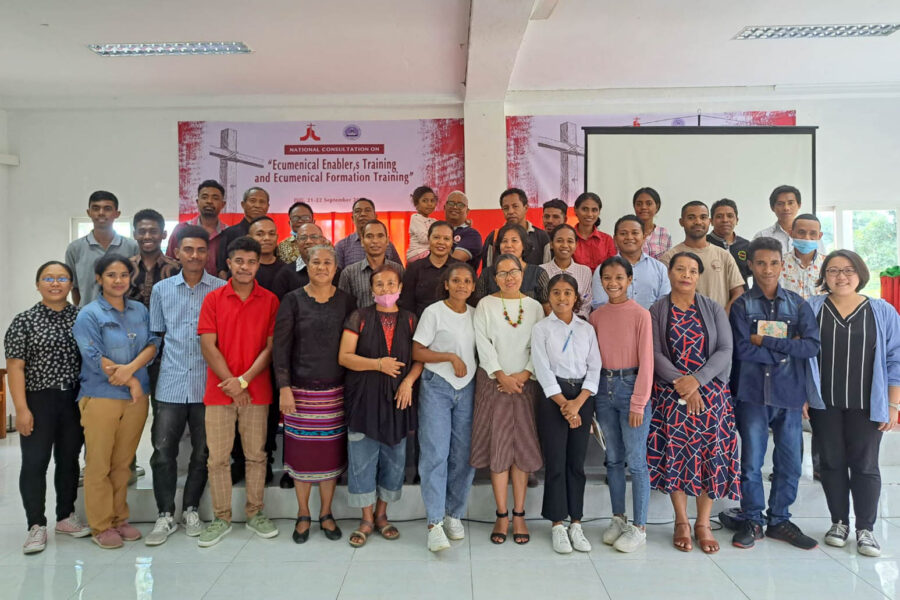CCA Trains Ecumenical Enablers in Timor Leste
 Participants of the CCA's Ecumenical Enablers Training Programme in Dili, East Timor
Participants of the CCA's Ecumenical Enablers Training Programme in Dili, East Timor
A training programme organised by the Christian Conference of Asia (CCA) for enabling the pastors and church workers in Timor Leste was held from 21 to 22 September at the headquarters of the Synod of the Igreja Protestante iha Timor Loro Sa'e (IPTL) in Dili, Timor Leste.
This capacity-building training aimed at reaching more church workers and equipping them with a basic understanding of ecumenism and the ecumenical movement.
In conjunction with the CCA's 2022 programme theme, ‘God of Hope, Sustain Your Creation in Harmony’, the training mainly focused on the discussion of living in harmony with God’s creation and sustaining harmony with God’s creation in the oikos.
The first session about ‘Oikoumene and Ecumenical Movement’ was led by Chalvin Tehuayo from CCA. There were sessions on key themes such as 'A More Visible Church', 'Encouraging Young People', 'A Pluralistic Environment', and 'A Mission with Meaning and Purpose'.
Rosiana Indah Purnomo of the Communion of Churches in Indonesia (PGI) facilitated three sessions on the theme ‘Participating in God’s Mission: Our Understanding’, ‘Reading the Bible in Our Context’, and ‘Christian Leadership: Stewardship, Servanthood and Accountability'.
Ms Purnomo reminded participants that the mission belongs to God and churches are called to participate in God’s mission, which is to bring life to all creation. From an ecumenical perspective, the Church is the household for all creation and is the witness of the resurrected Christ to all inhabitants. Therefore, the mission is a movement: a dynamic force to work together to do God’s mission. She concluded the session with a reflective question on whether the church in Timor Leste is involved in facilitating an ecumenical movement or in building an ecumenical monument, the former being dynamic and the latter being static and unresponsive to the groaning of creation.
In ‘Reading Bible in Our Context’, the participants were divided into four focus group discussions and given four different bible passages to reflect upon and to try to link with the current struggle or situation in Timor Leste.
The sharing from the participants was mostly on the efforts to deepen the identity of the Timorese as a people and also of the church and on ways of bringing into fruition the messianic message of the church. Since the majority of the congregation are farmers, it is important for the church leaders to also be concerned about agriculture development and to engage with this issue through their sermons and their diaconal ministry.
She then spoke about ‘Christian Leadership’ which sees Christ as a model of leadership, based on which one is called to be a servant, called to be responsible and to become a steward for all creation in this Oikos.
In the Timor Leste context, pastors and church leaders need to observe, to be aware of the issues in the community, to participate, act, and become models for the congregation, and to replicate: as a leader is someone who creates more leaders.
Levy Vasconcelos Pito, coordinator of the Theological Learning Centre of the IPTL, led a session on ‘Church in Accompaniment with People and Community’. Mr Vasconcelos Pinto spoke about the church’s responsibility of being aware of the crisis in our surroundings, and also of the ecological crisis and human rights violations in Timor Leste and the ways in which the local church could get involved in the efforts to overcome them.
Dr Mathews George Chunakara, General Secretary of CCA, who spoke at the closing session, encouraged the participants to reflect on how those who belong to the Church in Timor Leste could develop their own theology based on their experiences of long struggle for the right to self-determination—searching for, and establishing, their indigenous identity as an indigenous church in Timor Leste.
About 30 participants attended the training, including representatives from different denominations across the country.










